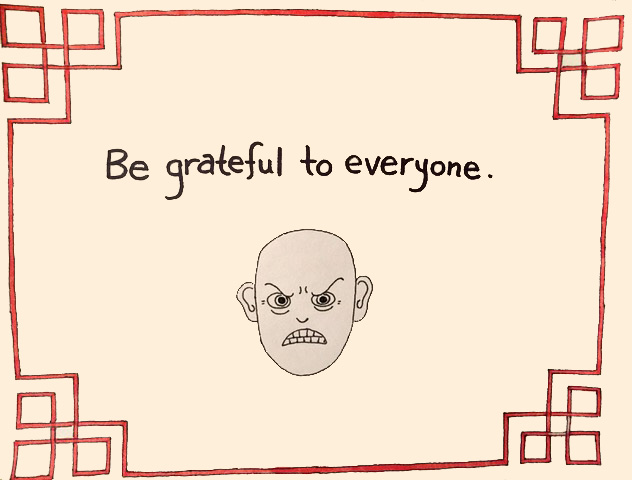 SLOGAN 13 • Be grateful to everyone.
SLOGAN 13 • Be grateful to everyone.
This slogan is about gratitude. Gratitude does not seem to be that front and central nowadays. Instead of appreciating what we have, we keep focusing on what we do not have. We are filled with grudges and resentments and have strong opinions about what we deserve and what is our due. We may be taught to say “please” and “thank you,” but what have we been taught about appreciation?
 In our commodified world, we see things as material for our consumption. We don’t ask, we just take. And in the blindness of our wealth and privilege, we don’t see how much we have to be grateful for. We take all that we have for granted and we live in a very ungrateful world.
In our commodified world, we see things as material for our consumption. We don’t ask, we just take. And in the blindness of our wealth and privilege, we don’t see how much we have to be grateful for. We take all that we have for granted and we live in a very ungrateful world.
This slogan assumes that we at least have basic gratitude for the good things that befall us. It then challenges us to extend that feeling of gratitude to include not just gratitude for what is positive, but gratitude for the negative also. Personally, I think we need to work on our basic gratitude, first. Simply adding this dimension to the way we view things would be a great improvement.
Conventional gratitude is based on distinguishing what we like from what we do not, good fortune from bad fortune, success from failure, opportunities from obstacles. By practicing conventional gratitude, we may begin to better appreciate times of good fortune and opportunity. But what about all the obstacles, unpleasant people, and difficulties in our life?
According to this slogan, we should be especially grateful for having to deal with annoying people and difficult situations, because without them we would have nothing to work with. Without them, how could we practice patience, exertion, mindfulness, loving-kindness or compassion? It is by dealing with such challenges that we grow and develop. So we should be very grateful to have them.
Today’s practice
To begin with, reflect on the things in your life for which you are grateful. Notice what happens when you acknowledge all that you have to be grateful for. Now reflect on something difficult, the kind of situation or person that would not inspire conventional gratitude. Can you extend your gratitude to include that as well? What happens when you do so?
